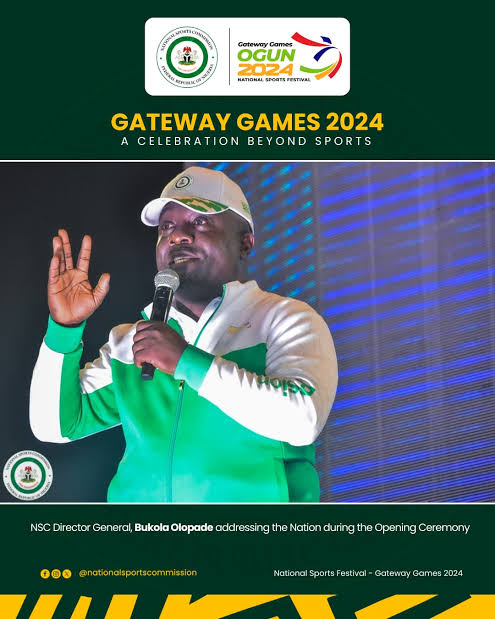Joel Ajayi
The 22nd National Sports Festival, also called Gateway Games 2024, will be remembered not only for the medals and milestones but for its atmosphere, excellence, and enduring legacy. More than just a competition, it became a celebration of unity, talent, and what’s possible when vision meets execution.
Held from May 16 to 31 across Ogun State, the festival was a vibrant blend of elite performance, grassroots inclusion, and cultural pride. Abeokuta transformed into a beating heart of national excitement, where athletes, fans, and communities came together under a shared banner of excellence and joy.
At the core of this triumph was the unquestionable commitment of Ogun State Governor, Prince Dapo Abiodun. His determination to leave a lasting legacy translated into the full renovation of the historic MKO Abiola Stadium and significant upgrades to the state’s sporting infrastructure. His leadership ensured that every detail from logistics to athlete experience was thoughtfully addressed. This festival didn’t just meet expectations; it raised the bar for what a host state can deliver.
Much of the credit also goes to the National Sports Commission ,NSC, led by the chairman, Mallam Shehu Dikko and Hon. Bukola Olopade, Chairman of the Main Organizing Committee and Director General of the NSC, whose hands-on leadership and tireless dedication were instrumental to the festival’s success. The NSC executed a flawless event, the result of months of detailed planning, collaboration, and commitment.
The 2024 National Sports Festival left a lasting infrastructural legacy for Ogun State. The iconic MKO Abiola Stadium received a comprehensive facelift, restoring it to world-class standards, while the Alake Sports Centre and several other venues were upgraded to meet the demands of high-level competition. A standout innovation was the introduction of a centralized accommodation model an unprecedented move in the festival’s history. All athletes were housed at Babcock University, whose state-of-the-art facilities, including independent power and water systems, provided a seamless living and competition environment. Complemented by a fleet of no less than 80 buses and more than 20 standby vehicles, transportation was efficient and stress-free, marking a new era of planning and execution for multi-sport events in Nigeria.
In a bold and historic initiative, the 2024 edition introduced over 300 Invited Junior Athletes ,IJAs, many under the age of 18, to compete alongside seniors. Backed by the NSC, the IJA initiative aimed to bridge the generational gap and expose emerging talents to elite competition. These young athletes didn’t just participate they impressed, excelling in events like football, athletics, swimming, taekwondo, weightlifting, and wrestling. It was a powerful statement about the future of Nigerian sport and the value of early investment in youth development.
Praise poured in from across the sports community. Dr. Abdul Ibrahim, President of the Nigeria Weightlifting Federation, called the festival a “generational victory for Nigerian sport”. He noted, “From the facilities to the sheer energy of the athletes, this festival brought new life to weightlifting and many other sports. The inclusion of junior athletes is a brilliant stroke that ensures continuity and growth. Ogun State delivered beyond expectations”.
Elder Paul Bassey, Commissioner for Sports in Akwa Ibom State, echoed those sentiments: “This was a sports festival in every sense of the word well-structured, beautifully organized, and emotionally stirring. The level of professionalism we witnessed, especially from the organizers and volunteers, was world-class. It’s a credit to Ogun State and a challenge to Enugu to raise the bar even higher next time”.
One of the most emotional moments came when wrestling icon Blessing Oborodudu took her final bow. In a poetic full-circle moment, she retired in the same city Abeokuta where her journey to stardom began during the 2006 Gateway Games. Nearly two decades later, she leaves the sport as an Olympic silver medalist, multiple-time Commonwealth champion, and a revered ambassador for Nigerian sports. Her farewell underscored how these Games were not only about beginnings, but also about meaningful endings.
While the official fixtures delivered stunning athletic feats, the real magic often happened after the final whistle. Each night, the corridors around the stadiums came alive with activity vendors, gamers, and revellers turning the evenings into a spontaneous carnival of food, laughter, and shared stories. The gaming zones, table tennis setups, and snooker boards became gathering points, creating an organic, unofficial tradition that captured the very soul of the festival. Though not on the formal schedule, this nightly rhythm became one of the defining features of the Games proof that sport’s true power lives in the connections it inspires.
Now, the baton passes to Enugu for the 23rd edition of the National Sports Festival. With expectations soaring, the legacy of the Gateway Games serves as both a challenge and a roadmap. Ogun State has shown what’s possible when ambition, support, and community come together with purpose.
The 22nd National Sports Festival was a masterclass in how to blend competition with culture, legacy with logistics, and dreams with discipline. It reminded us all that sport is not just about winning it’s about belonging, progression, and storytelling. Thanks to the visionaries, athletes, and every cheering voice in Abeokuta, Nigerian sports now stands taller, prouder, and more inspired than ever.
Here’s to Ogun. Here’s to the Games. And here’s to the golden future of Nigerian sports.





